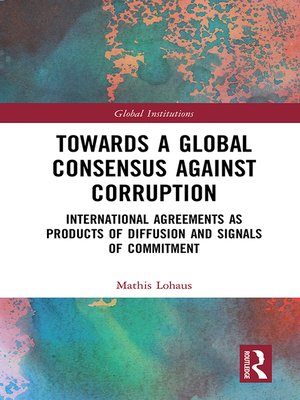Towards a Global Consensus Against Corruption
ebook ∣ International Agreements as Products of Diffusion and Signals of Commitment · Global Institutions
By Mathis Lohaus

Sign up to save your library
With an OverDrive account, you can save your favorite libraries for at-a-glance information about availability. Find out more about OverDrive accounts.
Find this title in Libby, the library reading app by OverDrive.



Search for a digital library with this title
Title found at these libraries:
| Library Name | Distance |
|---|---|
| Loading... |
Corruption has long been identified as a governance challenge, yet it took states until the 1990s to adopt binding agreements combating it. While the rapid spread of anti-corruption treaties appears to mark a global consensus, a closer look reveals that not all regional and international organizations move on similar trajectories. This book seeks to explain similarities and differences between international anti-corruption agreements.
In this volume Lohaus develops a comprehensive analytical framework to compare international agreements in the areas of prevention, criminalization, jurisdiction, domestic enforcement and international cooperation. Outcomes range from narrow enforcement cooperation to broad commitments that often lack follow-up mechanisms. Lohaus argues that agreements vary because they are designed to signal anti-corruption commitment to different audiences. To demonstrate such different approaches to anti-corruption, he draws on two starkly different cases, the Organization of American States and the African Union.
Contributing to debates on decision-making in international organizations, this work showcases how global governance is shaped by processes of diffusion that involve state and non-state actors. The book highlights challenges as well as chances linked to the patchwork of international rules. It will be of great interest to students and scholars of IR theory, global governance, international organizations and regionalism.







